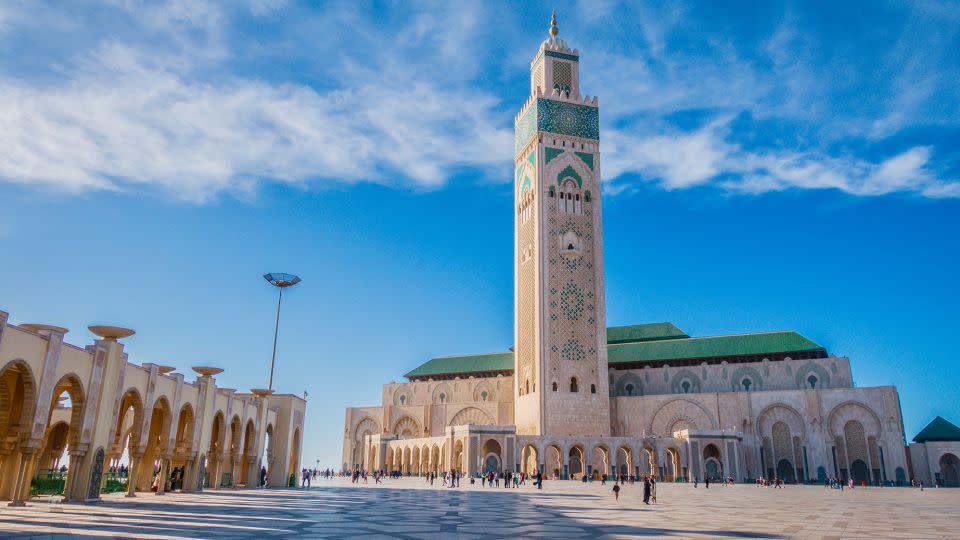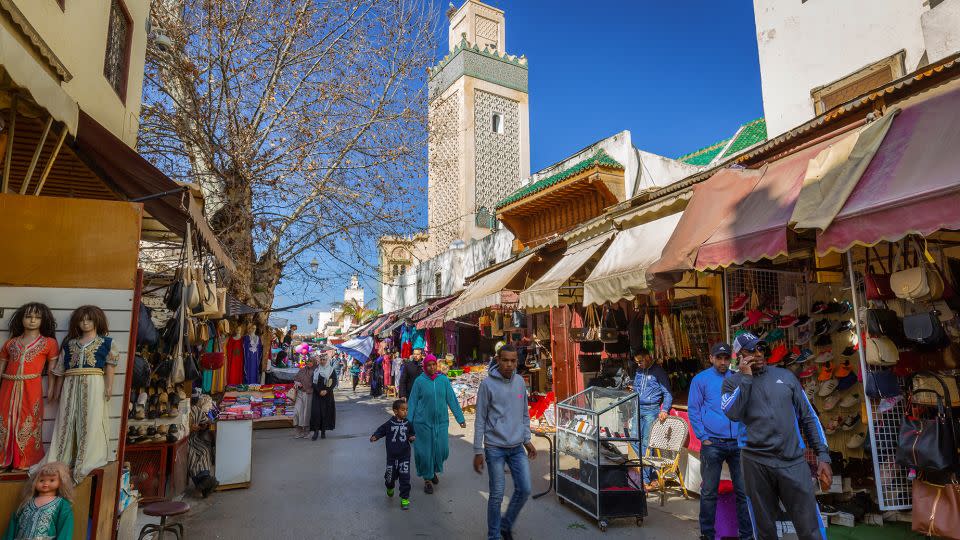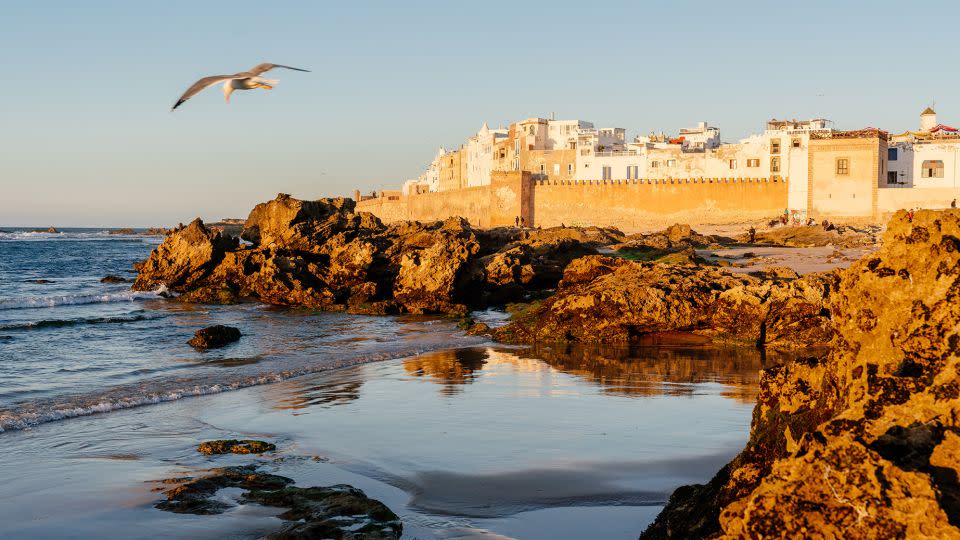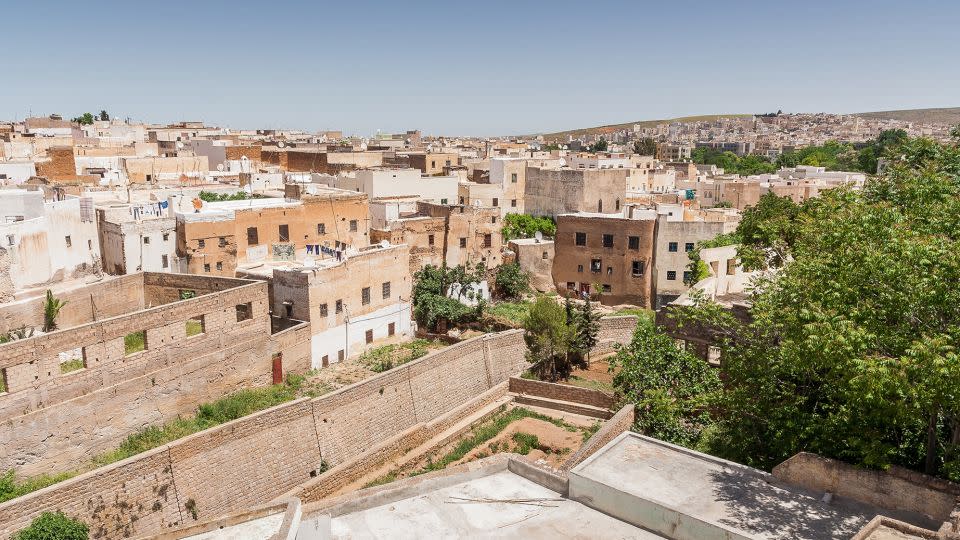What travelers to Morocco need to know following the recent earthquake
- Oops!Something went wrong.Please try again later.
Editor’s Note: Sign up for Unlocking the World, CNN Travel’s weekly newsletter. Get the latest news in aviation, food and drink, where to stay and other travel developments.
Thousands of people are known to have killed in the Morocco earthquake, with the death toll expected to rise as rescuers continue to search for survivors. As the country’s King Mohammed VI thanks Spain, Qatar, the UK and the UAE for sending aid, stories are emerging of the devastating impact on local communities.
If you were due to travel to Morocco, should you still go? Your instinct might be to stay away, as going on vacation in a country in national mourning seems unseemly. However, that’s not necessarily the best course of action, say those on the ground. Here’s what to know about travel to Morocco as the situation continues to unfold.
Which parts of the country have been affected?
The epicenter of the 6.8-magnitude earthquake, which hit on Friday night, was in the High Atlas mountain range, about 72 miles southwest of Marrakech, in the province of Al Haouz, which has had the highest number of casualties.
It was felt strongly in Marrakech, where the historic medina has been damaged. Seaside cities popular with vacationers such as Essaouira and Agadir also felt it strongly, while the quake was felt as far north as Casablanca and Fez, around 300 miles northeast of Marrakech (although no damage has been done in either city, or the north of the country as a whole).
It is the deadliest earthquake in Morocco in over 60 years.
“When the earthquake struck it caused a lot of fear and confusion – Morocco is not used to earthquakes, and it took some time for the local authorities to provide advice” says Zina Bencheikh, Intrepid Travel’s Morocco-based managing director EMEA. The company had around 650 travelers in the country when the quake hit.
“Outside of the Atlas Mountains and the [Marrakech] medina, most of the country is now running as usual, with transport including trains and other services continuing to operate as usual, including airports.”

Is Marrakech badly damaged?
The quake has caused damage in the medina, or old town. A mosque in Jemaa el-Fna, the iconic square that doubles as the heart of the city, is “barely recognizable,” according to CNN’s Ivana Kottasová, who has been reporting from Marrakech. Its ornate tower has “almost entirely collapsed.”
As of September 11, all historical monuments in Marrakech were closed until further notice, including key sites such as the Bahia Palace, Saadian Tombs and El Badi Palace.
However, private museums, galleries and institutions are already open, as are the souks, where storeowners told the AFP news agency that there are already concerns about plummeting visitor numbers.
Public transportation has resumed and is now running normally. And while some hotels in the medina have closed due to structural damage, most are open.
Kottasová – who arrived in Marrakech on Saturday night, and has seen people sleeping in the city’s parks – says that she saw visitors getting guided tours, and people getting coffee in the new districts.
“People who are arriving now would see rubble in some places but it’s not like the city has stopped. You could visit and ignore the impact if you wanted to.” The new areas of the city look “untouched – like a normal metropolis,” she says.
Bilal El Hammoumy, co-founder of tour operator Inclusive Morocco, says there has been “significant damage in the medina, especially in the old Mellah and the Jewish Quarter.”
Hotelier Vanessa Branson, co-owner of luxury hotel El Fenn – which suffered cosmetic damage, but has stayed open throughout – says that the medina is “doing OK.”
“Any business that is able will be back open this week, most already are – most hotels are open, the restaurants are open and most of the medina’s streets are accessible, having been swiftly cleared of debris,” she says.
“Majorelle Gardens, Le Secret Garden and the Musee Des Confluences are all welcoming visitors too. Some areas of the souks have a little more disruption, but many stalls are already open for business.”
“The city is busy with the cleanup operation in progress, and though the buildings and people will bear the scars for a long time to come, the city is shaken, not stirred. The mountains will obviously take a little longer to recover.”

How about the High Atlas Mountains?
“I don’t think tourists should be going here [to the High Atlas mountains] right now,” says Kottasová, who is currently in the area reporting, and has driven through tourism-hub villages that have been devastated, past roadside souvenir stalls that have been completely destroyed, and has seen newly homeless people setting up camps. “All the houses are gone, people are sleeping in tents,” she says. “Some of the roads have not been entirely cleared, and there’s a lot of traffic delivering humanitarian aid.”
Kasbah Tamadot, a luxury retreat owned by Branson’s brother, Virgin founder Richard Branson, was closed due to damage.
It’s one of many, says El Hammoumy.
“Many hotels in the High Atlas Mountains have had considerable structural damage with some of them closing,” he says. His company is advising clients due to visit, to reroute to the north of the country, or reschedule for a later date – not just because of damage to infrastructure, but to allow first responders swift access to the remote areas. “I would advise people to wait a while to visit the High Atlas Mountains, but I think Marrakech can still be visited immediately,” he says, warning that the city is muted because of the country’s state of mourning.
What about the rest of the country?
Business as usual. Meryem Ameziane is a tour guide in Fez – she has not canceled a single tour since the earthquake.
“I’m on tours every day,” she says.
“None of the northern part was affected by the earthquake, all the roads between the cities are operating as usual. We are at the beginning of high season for tourism and we are all praying that business will continue as usual.”
Popular destinations such as Merzouga, Skoura and the Sahara Desert are unaffected, she says, along with northern cities.
She says that people shouldn’t feel guilty or embarrassed about continuing with their trips.
“We really need the support of travelers to visit Morocco and support the economy, because we have a lot to go through to help the people affected by the earthquake and rebuild the destroyed villages.
“I would say that the only part to avoid is the High Atlas mountains, to help the authorities with the rescue process. Otherwise, Morocco is perfect to visit.”
“The main cities are quiet – for travelers, everything you want to come to Morocco for, the situation is OK,” says Abdelilah El Khadir, who works at the front desk at the Tour Hassan Palace hotel, in Rabat.
“Sometimes there is a polemic about going to a destination after an earthquake, but the earthquake has passed three days ago and the situation is quiet right now,” he adds.
“Here [in Rabat], everything is good.”

What is it like for tourists on the ground?
The airports are open and flights are continuing as usual, including in Marrakech. Writer Anabel Dean was in Fez when the earthquake hit – her riad in the medina shook but there was so little impact in the city that she was able to take part in a guided food tour the following day.
“It was clear that my guide was fragile, she’d had very little sleep. I kept saying we don’t have to do this but she absolutely refused to leave,” says Dean.
Stallholders were still working, and still had time to speak to her warmly, she said.
Instead of continuing to Marrakech as planned, where she’d been due to attend a now-canceled conference, she took the train to Rabat, where she flew to Paris. Nothing about the station or the train journey was different from when she arrived three days earlier, she says.
Meanwhile, her tour operator Inclusive Morocco, rerouted her to Rabat before flying her out to Paris. A company representative called her the morning after the quake to check on her. “They were based in Marrakech but still reaching out – I was really impressed,” she says.
Bencheikh emphasizes that the rest of the country is operating normally, from northern cities such as Casablanca, Fez and Chefchaouen, to tourist destinations such as Ait Benhaddou and Dades Valley in the south of the country.
Will my trip go ahead?
Check with your tour operator, as each is doing something different. Intrepid, for example, immediately canceled imminent departures to see how the situation progressed. It is now reinstating departures from September 14, but adjusting trips, canceling Marrakech medina activities and rerouting visits to the High Atlas Mountains.
World Expeditions, a trekking-focused tour operator, has proceeded with all Morocco tours other than its High Atlas Trek, which is being rerouted. The company was unable to answer what happens if travelers no longer wish to go.
If you don’t want to travel, your first port of call should be your tour operator, to see if it will allow you to reschedule, change to a different destination, or simply reimburse you in the circumstances. You will not usually be able to claim reimbursement on your travel insurance unless your government advises against travel.
Currently the US State Department has no travel advisory for Morocco. The UK Foreign Office doesn’t advise against travel, instead advising travelers to check with their tour operator whether their trip is going ahead.
Also check with your airline to see if there is any leeway for those no longer wishing to travel. Some are also laying on extra flights to pick up travelers who wish to return home.
Should you travel, even if you can?
Yes, says Vanessa Branson, who welcomed new arrivals this weekend (they arrived “on time and without issue,” she adds).
“If tourists stop traveling to Morocco it will have a huge impact on the livelihoods of the people and businesses that rely on them – visitors bring with them hope of recovery. I urge guests not only to stick to their plans to visit Morocco but to make plans to visit if they’ve not already. I’d just recommend using a guide to get around here.”
El Hammoumy agrees: “Unfortunately, the same people who are now suffering the aftermath of the earthquake rely on the tourism industry as a source of income. The sector provides tremendous support to everyday Moroccans to put bread on the table,” he says.
“We encourage people from around the globe to visit this coming fall – it will show a great support to the local community and will uplift the spirits and help the resilient Moroccan society get back on its feet quickly.” He is concerned that people will stay away, further damaging the country’s economy, he says – triply devastating since the stalled tourism of the covid pandemic.
“The earthquake struck during one of the busiest months for tourism, and many of our tour leaders and partners are concerned that it will deter people from visiting,” says Bencheikh.
“Our teams and suppliers say the best thing people can do to support local communities is to continue to travel to Morocco while avoiding the most impacted areas. The country will need tourism more than ever as it rebuilds.”
Dean says that people were already “expressing concern about the loss of tourism” during her time there.
“Rabat is the capital and Casablanca is the business capital, and they will continue to flourish, but there have been cancellations [from tourists] in Fez, the markets were quieter, and there was real concern. The initial shock and horror was being joined by concern for the future.”

Is there an an alternative to the High Atlas mountains?
Yes, says El Hammoumy – the Middle Atlas mountains, which are considered to be in the north of the country, about 90 minutes southeast of Fez. Despite the similar name, they have not been affected by the earthquake, lying around 400 miles away from the epicenter. Areas such as Azrou and Ifrane are particularly popular with travelers.
“They can offer a variety of similar experiences to those in the High Atlas that can expose them to rural life in Morocco and the Berber culture,” he says.
How to travel if you do go
For Dean, traveling with a tour operator that is really rooted in the country is crucial. “Their concern for tourists and people on the ground has been astonishing given what they’re facing,” she says of Inclusive Morocco.
She also recommends using a guide – as it happens, she was out with Ameziane in Fez the day after the earthquake.
“Meryem was advising me [about next steps] – I didn’t think about the danger because I felt safe the whole time because of her. It reminded me of the great value of tour guides – you don’t think about how much you might need them in a catastrophe.”
Buying good travel insurance is a must.
For more CNN news and newsletters create an account at CNN.com

